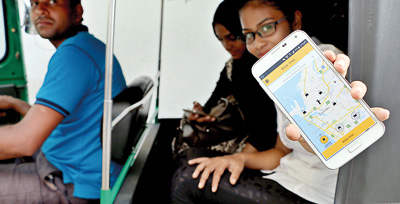Taxi app PickMe rings up Rs. 150 mln in private funding
Popular Sri Lankan taxi aggregator app PickMe has already extended its local reach to about 75,000 users and 2,000 taxis, of which 70 per cent are trishaws, within the three short months since the app went live to the public on in June this year.
This also followed several months of a pilot wherein, since November of last year, the focus had been on educating people about the app and it’s potential.
 Speaking to the Business Times, Jiffry Zulfer, the Chief Executive of Digital Mobility Solutions Lanka, PickMe’s developer, also revealed that, today, customers using the app within its current service areas of Colombo and its suburbs had a wait time of approximately five minutes due to this location based app allowing them to select a driver from a proximity of within 2 km. This is in contrast to other services that utilised a First-In-First Out (FIFO) model of service delivery, where taxis were not tracked via their location and could take much longer to arrive than expected.
Speaking to the Business Times, Jiffry Zulfer, the Chief Executive of Digital Mobility Solutions Lanka, PickMe’s developer, also revealed that, today, customers using the app within its current service areas of Colombo and its suburbs had a wait time of approximately five minutes due to this location based app allowing them to select a driver from a proximity of within 2 km. This is in contrast to other services that utilised a First-In-First Out (FIFO) model of service delivery, where taxis were not tracked via their location and could take much longer to arrive than expected.
He also commented that, often when it came to other taxi services, use of the FIFO model resulted in drivers lying to passengers since they were scared of losing fares, especially if they were far away, or even charging different rates for locals and foreigners, which was leading to a general feeling of mistrust of taxi drivers by the public. However, with PickMe, since the driver’s location was visible and being tracked in real time, the system was fully transparent. Location-based GPS tracking also provided an added level of safety, security, etc, which was enhanced even further since PickMe drivers were registered and checked out ahead of time.
At the same time, he also noted that, as and when more taxis sign up with PickMe, it is likely that wait times and proximity area sizes would reduce further, enabling an even faster service. From the driver’s perspective, the app was highly useful because it significantly cut, by as much as 50 per cent, the driver’s lost mileage cost, which is a taxi industry term denoting the amounts wasted on fuel while repeatedly circling and fishing for hires. Mr. Zulfer also indicated that there had been negotiations with the unions to bring the running costs of trishaws down to Rs. 35, from Rs. 40 previously, which was also helpful to many of PickMe’s drivers, enabling greater profitability. Further, since the app was available in all three local languages, it also attracted the interest of non-Sri Lankans who could input their details of their journey in English, with the app already being used by a lot of Maldivians travelling around Colombo, according to Mr. Zulfer.
Importantly, Mr. Zulfer, a former founding team member of Anything.lk, revealed that the company had, as of now, raised Rs. 150 million from private funding, including high net worth investors like Ajit Gunewardene (Deputy Chairman-JKH), which would secure their funding for immediate expansion, even enabling growth outside of Colombo to other areas based on the perceived demand for their service. At present, revenues from this service was derived from two sources, namely commissions on driver hires, with these being restricted to only those secured via the app, along with subscription charge for customers using the app.
While no other, new revenue streams for the immediate future were shared by Mr. Zulfer, it should be taken into account that, because this app is based on the globally famous Uber model, adapted very differently from country to country; there remains the possibility of more revenue options coming into existence organically once this service becomes further established. One such example is deliveries, which he already admitted was a PickMe use case being discussed.
Interestingly, Mr. Zulfer also noted that, as of now, PickMe’s biggest challenge was sourcing enough drivers to grow, with the company already going to the extent of equipping drivers with the smartphones, which are required for the service, since this was the major hurdle at the moment. He added that while initially the company paid for these, these costs had shifted to the drivers with costs recouped fairly quickly.
Meanwhile, the company was also offering drivers frequent trainings for these smart devices as well as even etiquette training, etc to improve their service. This has also been coupled with a rating feature on the app to enable those offering good service to be recognised while those that cheated the customers, etc could be tracked down by repeated behaviours and barred from the service since trip records and other data could be pulled up and rechecked base on customer complaints or frequent negative ratings. Said Mr. Zulfer, “We are bringing in professionalism into an industry that has not had it before”,


